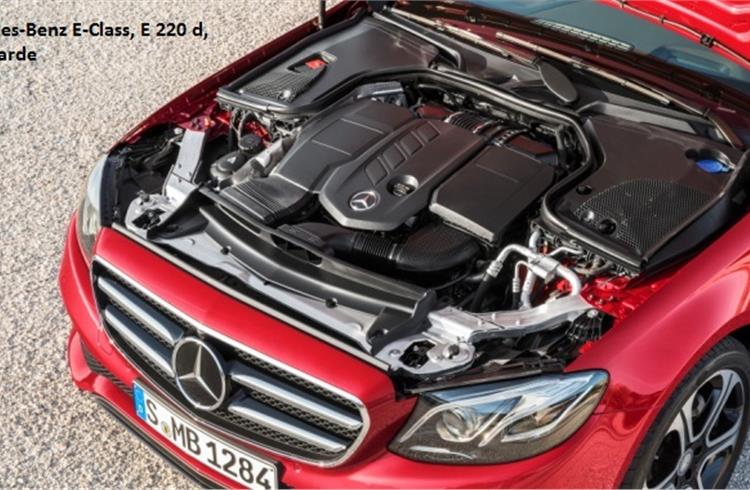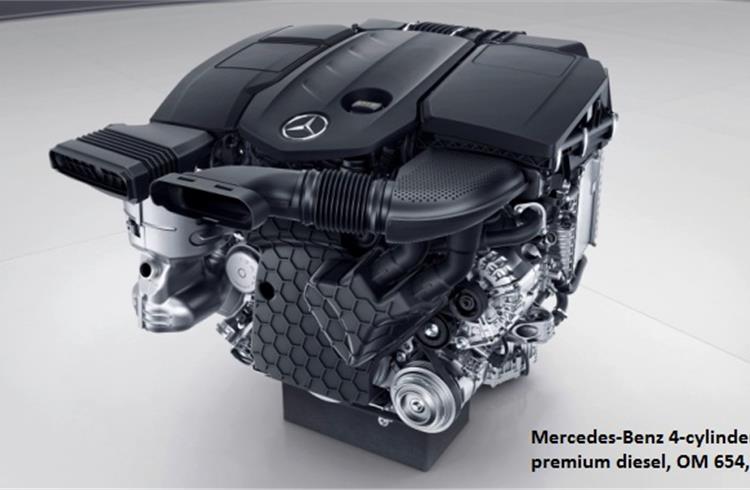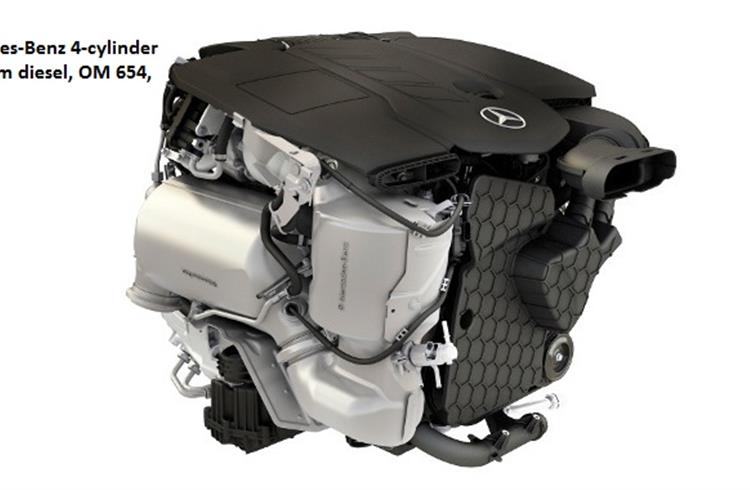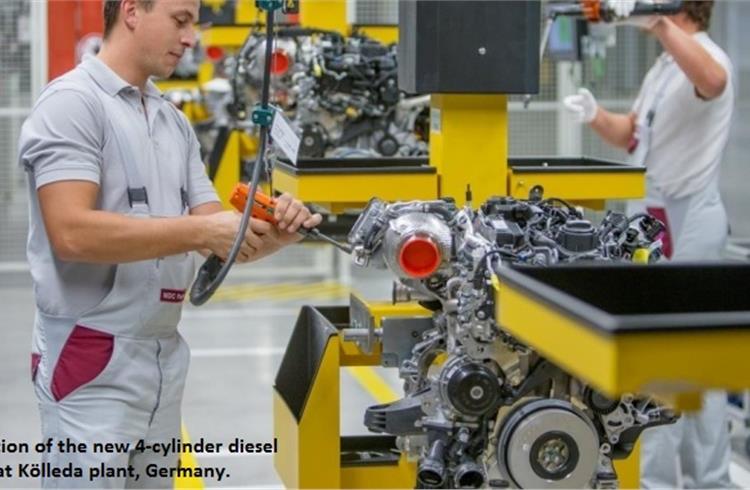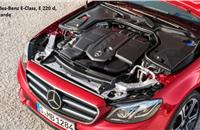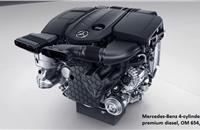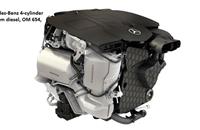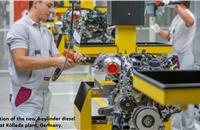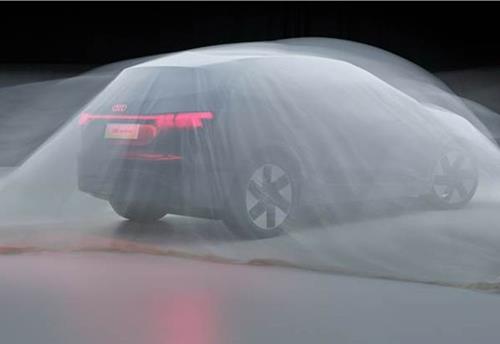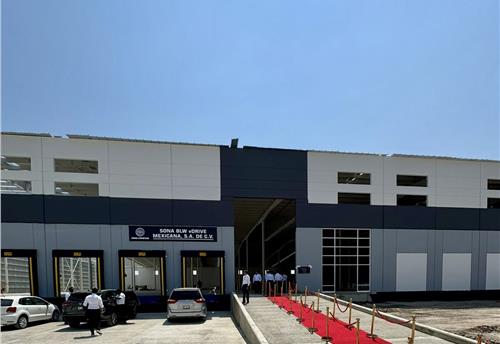Mercedes-Benz invests €3 billion in more efficient engine technology
Along with a new family of diesel engines that fulfill future RDE requirements, Mercedes is also planning for petrol engines with particulate filters in the future.
Mercedes-Benz is investing a total of about €3 billion (Rs 22,500 crore) for improvements in fuel consumption and emissions of new engine technology, which will be used in both future and current vehicles.
With its newly developed family of diesel engines, Mercedes-Benz is the first manufacturer to put diesel vehicles on the market that already fulfill the stricter emission limits planned for the EU as of September 2017. This integrated technology approach includes new stepped combustion chambers and further developed exhaust-gas recirculation. The new engine design also allows all components for exhaust-gas recirculation to be positioned directly on the engine, instead of under the car floor as previously.
The company is on an expansion spree with plans to invest €500 million (Rs 3,822 crore) in a new engine production facility in Poland along with a €580 million (Rs 4,425 crore) investment in its Kecskemet plant in Hungary to develop next-gen compact cars by 2018.
The market launch of the newly developed four-cylinder diesel engine OM 654 is in the new E-Class. The E 220 d now consumes as little as 3.9 litres of fuel per 100 km (combined according to the NEDC currently prescribed for all manufacturers), although the engine is more powerful than its predecessor [72.4 mpg] (195 hp compared with 170 hp). This corresponds with CO2 emissions of 102 g/km.
The new four-cylinder engine is the first member of a modular engine family that will be applied throughout the entire portfolios of Mercedes-Benz cars and vans. Several levels of power output are planned, as well as longitudinal and transverse installation in vehicles with front-, rear- and all-wheel drive. Consequently, the carmaker plans to equip its entire range of diesel cars in Europe with its latest engine generation including SCR technology (selective catalytic reduction) by 2019 at the latest.
Commenting on the development, Prof Dr Thomas Weber, Daimler’s board of management member for Group Research and Mercedes-Benz Cars Development said: “Our customers’ trust is very important to us and we take our responsibility to the environment very seriously. That’s why we decided five years ago to invest massively in the further development of diesel technology. But we are also continuously making our petrol engines more efficient and more environment-friendly; because high-tech combustion engines will remain the backbone of individual mobility until the widespread market success of electric vehicles. For this reason, we are investing a total of about €3 billion to ensure further improvements in fuel consumption and emissions – in both future and current vehicles.”
DEKRA confirms below-limit NOx emissions
The new family of diesel engines also has the advantage of particularly low nitrogen-oxide emissions, which has been confirmed by independent measurements by DEKRA, a German vehicle inspection company. The DEKRA experts carried out an extensive test program with a Mercedes-Benz E 220 d. The focus was on Real Driving Emissions (RDE), the method prescribed in the EU as of September 2017 in addition to measuring emissions on the test bench.
The RDE dynamic test program covers various stretches of road that include urban streets, country roads and freeways. The measurements were carried out at various temperatures between 2 – 16°C, and with various numbers of occupants and varying loads. As a result, the E 220 d emitted less NOx than the limit of 80 mg/km on all applicable RDE routes. In some cases, the NOx emissions were at the very low level of between just 13 and 21 mg/km even at low ambient temperatures.
Improvement with current diesel engines
The German carmaker made use of optimisation with regard to turbocharging and further development of fuel injection and inter-cooling, as well as the application of new materials such as chromised timing chains in the current family of vehicle models. The operating range of exhaust-gas recirculation has now been extended towards significantly lower temperatures along with increased efficiency of the SCR systems. This was achieved by modifying the design of the exhaust system and by applying new catalyst materials. The entire package of measures is now being applied in series production.
With the entry-level engines of the compact cars (A- and B-Class and the CLA and GLA) and with the V-Class, the company is offering the recent improvements as a software update on cars already on roads in the context of a voluntary service action to be implemented in the coming months, starting with the V-Class in June.
Future petrol engines with particulate filters
Many of the modern Mercedes-Benz petrol engines emit lower levels of particulate matter by means of modifications within the engines as well as through the application of piezo injectors. The company plans the large-scale use of particulate filters also for petrol engines. After more than two years of positive field tests with the Mercedes-Benz S 500, additional versions of the S-Class with petrol engines are to be equipped with the new technology with the next model upgrade. That will be followed by gradual implementation in further new models, model upgrades and new engine generations. After that, particulate filters will also be applied in the current model ranges.
RELATED ARTICLES
Audi Q6L e-tron, Q5 e-tron RS, SQ6 coming to Beijing motor show 2024
Long-wheelbase Audi Q6 e-tron, SQ6 based on PPE platform.
Sona Comstar opens new plant in Mexico to cater to growing EV demand in N America
The new facility, set up to meet the growing demand for high-quality driveline solutions for BEVs in North America, will...
Earth Day 2024: each day is about reducing emissions and saving Planet Earth
Earth Day is every day, and anywhere you are. And in a time of climate change, it’s the last call for a healthier planet...





 By Autocar Pro News Desk
By Autocar Pro News Desk
 27 May 2016
27 May 2016
 5149 Views
5149 Views



